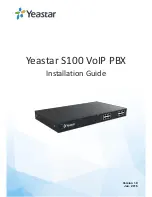
•
To receive Caller ID information, you must subscribe to the telephone company’s Caller ID service and
enable Caller ID for the appropriate CO line through system programming.
Caller ID to SLT Port:
Caller ID information can also be shown on a single line telephone (SLT) display. This feature is available only
for SLTs compatible with FSK-type Caller ID.
1.
Caller ID Features
There are three features which can receive Caller ID information. The available feature depends on the
type of CO line receiving the call.
Feature
Description
Details in
Caller ID
Receives caller information sent from the
telephone company over analog CO lines.
–
Calling Line Identification
Presentation (CLIP)
Receives caller information sent from the
telephone company over ISDN lines.
–
Automatic Number
Identification (ANI)
Receives caller information sent from the
telephone company over T1 lines.
®
2.
Caller ID-Related Features
Feature
Description
Details in
Calling Line Identification
(CLI) Distribution
Caller ID information received by the PBX is used
to direct calls from specific callers to specific
destinations. The caller’s telephone number and a
destination must be assigned in the System Speed
Dialing Table.
®
(Calling Line
Identification)
Distribution
Incoming Call Log
Caller information is automatically recorded in the
call log of the extension which received the call.
This information can be used to view a record of
incoming calls or make calls to any number in the
call log.
®
3.
Automatic Caller ID Number Modification
When a call is received, the PBX can automatically modify the caller’s telephone number according to a
preprogrammed set of rules (Caller ID Modification Table). This modified number will be automatically
stored in the extension’s Incoming Call Log, allowing the extension user to make a call to this number later
without worrying about CO Line Access numbers, area codes, etc.
Each trunk group can be assigned a modification table. Each table has ten formulas for modifying local/
international numbers, and one formula for modifying long distance numbers. When a call is received, the
PBX compares the received telephone number to the area codes programmed under "Local/International
Call Data" first. If a match is not found, the telephone number will be modified according to the method
programmed under "Long Distance Code".
Document Version 2013-05
Feature Manual
35
3.1.3 Caller ID
Summary of Contents for KX-NCP500
Page 13: ...Section 1 Features and Configurations A Document Version 2013 05 Feature Manual 13...
Page 27: ...Section 2 Features and Configurations B Document Version 2013 05 Feature Manual 27...
Page 30: ...30 Feature Manual Document Version 2013 05 2 1 1 BGM Background Music...
Page 31: ...Section 3 Features and Configurations C Document Version 2013 05 Feature Manual 31...
Page 75: ...Section 4 Features and Configurations D Document Version 2013 05 Feature Manual 75...
Page 100: ...100 Feature Manual Document Version 2013 05 4 1 12 Doorphone Call...
Page 101: ...Section 5 Features and Configurations E Document Version 2013 05 Feature Manual 101...
Page 112: ...112 Feature Manual Document Version 2013 05 5 1 9 External Sensor...
Page 113: ...Section 6 Features and Configurations F Document Version 2013 05 Feature Manual 113...
Page 135: ...Section 7 Features and Configurations G Document Version 2013 05 Feature Manual 135...
Page 140: ...140 Feature Manual Document Version 2013 05 7 1 1 GROUP FEATURES...
Page 141: ...Section 8 Features and Configurations H Document Version 2013 05 Feature Manual 141...
Page 149: ...Section 9 Features and Configurations I Document Version 2013 05 Feature Manual 149...
Page 185: ...Section 10 Features and Configurations L Document Version 2013 05 Feature Manual 185...
Page 193: ...Section 11 Features and Configurations M Document Version 2013 05 Feature Manual 193...
Page 204: ...204 Feature Manual Document Version 2013 05 11 1 5 Mute...
Page 205: ...Section 12 Features and Configurations O Document Version 2013 05 Feature Manual 205...
Page 212: ...212 Feature Manual Document Version 2013 05 12 1 5 Operator Features...
Page 213: ...Section 13 Features and Configurations P Document Version 2013 05 Feature Manual 213...
Page 296: ...296 Feature Manual Document Version 2013 05 13 1 32 PT Programming...
Page 297: ...Section 14 Features and Configurations Q Document Version 2013 05 Feature Manual 297...
Page 301: ...Section 15 Features and Configurations R Document Version 2013 05 Feature Manual 301...
Page 307: ...Section 16 Features and Configurations S Document Version 2013 05 Feature Manual 307...
Page 332: ...332 Feature Manual Document Version 2013 05 16 1 10 Syslog Record Management...
Page 333: ...Section 17 Features and Configurations T Document Version 2013 05 Feature Manual 333...
Page 354: ...354 Feature Manual Document Version 2013 05 17 1 6 TRS Toll Restriction...
Page 355: ...Section 18 Features and Configurations U Document Version 2013 05 Feature Manual 355...
Page 357: ...Section 19 Features and Configurations V Document Version 2013 05 Feature Manual 357...
Page 379: ...Section 20 Features and Configurations W Document Version 2013 05 Feature Manual 379...
Page 388: ...388 Feature Manual Document Version 2013 05 20 1 5 Wireless XDP Parallel Mode...
Page 389: ...Section 21 Appendix Document Version 2013 05 Feature Manual 389...
Page 415: ...Index Document Version 2013 05 Feature Manual 415...
Page 421: ...Document Version 2013 05 Feature Manual 421 Notes...































